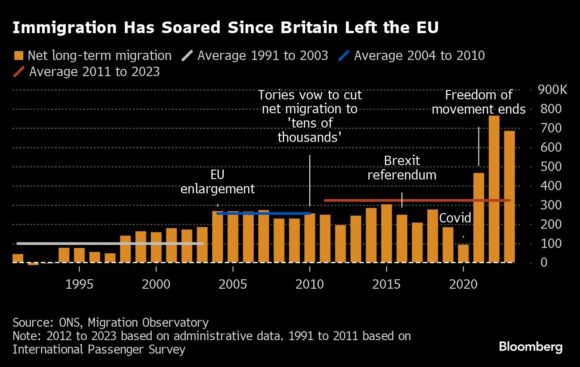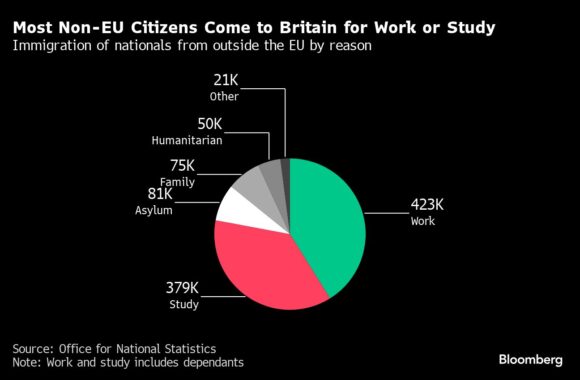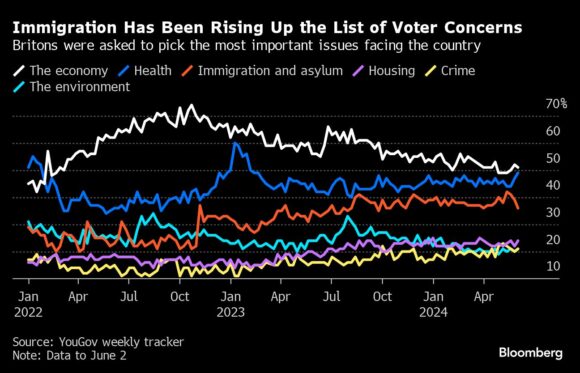Irish workers have been making the short trip over to the UK to find employment for centuries, escaping famine and more recently the aftermath of the financial crisis.
But new data suggests that job seekers from across the Irish Sea are drying up after Britain’s departure from the European Union amplified a growing anti-immigrant tone coming from politicians.
Workers from Ireland have dropped out of the list of top 10 nationalities seeking jobs in Britain, according to data from the recruitment site Indeed covering interest in vacancies from across the world. That marks a sharp reversal from the situation in 2016, when Irish ranked second in the UK.
It’s part of a seismic shift in the make-up of foreign labor seeking employment in the UK. Record levels of immigration made the issue a political hot-button in the UK’s general election campaign, with Brexit shifting the flow of foreign workers into Britain away from the EU and toward countries further afield.
While official data shows migrant flows from the EU, Indeed’s data provides more up to date figures that drills down into where job-seeker interest is coming from within the bloc.
It showed that in 2016, the top four countries where workers were searching for UK jobs were the US, Ireland, France and Spain. In 2024, it had shifted to India, the US, Pakistan and Australia. Ireland, Italy, Austria, Poland and Romania have dropped out of the top 10 altogether. Nigeria, the UAE and South Africa were among the countries to enter the top 10.
Nigel Farage, who leads the far-right Reform UK party, has sought to capitalize on anger about immigration and is gaining traction in polls with a promise to clamp down on arrivals. That’s left Conservative Prime Minister Rishi Sunak on the defensive after the government let migration spiral ever higher during 14 years in office.

Applicants looking for UK jobs switched from being predominately Europe-based in 2016 to far-flung corners of the world, which have seen barriers to entering Britain liberalize since Brexit. It led to a plunge in job seekers from Ireland, Italy and Poland, replaced by those from Asia and Africa.
Job seekers are now coming from the “Anglosphere, former Commonwealth countries, and certainly African countries in the case of health care,” said Jack Kennedy, economist at Indeed Hiring Lab. “We definitely see that the share of those countries has increased at the expense of European countries.”
Irish citizens can work and live freely in the UK under a mobility agreement that predates the EU, but shifts in immigration rules have had a bigger impact on those from other countries. Those controls made it harder for UK companies to bring in cheap labor from the EU — but they also cracked open the door a little wider to people from non-EU countries.
For the Irish, the shift could also reflect a strengthening jobs market at home and other parts of Europe. Ireland’s unemployment rate of 4% is near lows reached in the middle of last year — and below the UK’s reading.
Yet Brexit has left immigration one of the key issues for voters. Some polls suggest Reform has leapfrogged the Conservatives into second place in terms of vote share, trailing only Keir Starmer’s Labour Party.
One post-EU referendum survey suggested that the country of origin mattered to Britons, who were more tolerant of arrivals from the likes of Australia and France than Nigeria, Pakistan and Romania.

Another poll from 2014 suggests that the British public were more concerned about the level of skill, being equally tolerant of workers from Poland and India if they were professionals.
“We’ve seen quite a strong rebound from pandemic lows in terms of the share of searches from outside of the UK,” said Kennedy. “That’s up to about just over 5% from below 3% at the depths of the pandemic, which is a stronger rebound than a lot of mainland European countries.”
Photograph: A sign advertising job openings in the window of a restaurant in London. Photo credit: Chris Ratcliffe/Bloomberg
Copyright 2024 Bloomberg.
Interested in Brexit?
Get automatic alerts for this topic.

